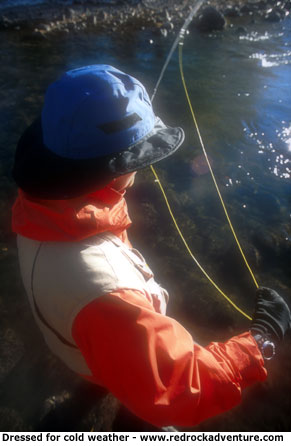By Larry Tullis
 To some, winter is a sad time, a time for hibernation of sorts from the outdoor activities that make our lives complete. Fishing, hunting and hiking are forgotten until the melting snows draw us out into the natural world again.
To some, winter is a sad time, a time for hibernation of sorts from the outdoor activities that make our lives complete. Fishing, hunting and hiking are forgotten until the melting snows draw us out into the natural world again.
To others, winter is a wonderful time that is used to complete cleaning and repair on tackle, tie flies, build rods, read fishing books and magazines and to take an occasional winter fishing excursion.
If you fished too much this summer (is that possible?) then the break can make you dream again of those golden days when the weather is good and the fish are biting.
Sometimes dreaming is not good enough and you venture out into the frozen world to get a taste of nature again. If you're prepared, the trip can be exhilarating and if you freeze, the trip can be pure agony or drudgery. Either way, winter trips often bring some good stories.
I remember one trip when a friend had waded to shore to rest on a big rock. His wet neoprene waders froze him solid to the cold rock like a tongue to a frozen flagpole. He couldn't get up and couldn't reach the water to splash it on the rock and melt himself loose. After sitting there a while, he decided the only way to get off this rock was to slip out of his waders.
That's how I found him, standing in his long underwear, splashing water on the waders, trying to melt them off the rock. We finally got them off but by then my friend looked like a Popsicle and we had to leave to thaw him out. I laughed lots but he couldn't laugh until he changed into some dry clothes and thawed out some.
Nothing can ruin a trip faster in the winter than getting wet. So a big part of winter fishing has to be preparing clothing that will keep you warm and dry. Your torso must be insulated properly and you have to have a good hat. Warm hats are invariably bulky, ugly contraptions and if they are stylish then they are probably not warm enough.
If you use the same pair of waders that you used in the summer you may have a problem keeping your feet warm. Too many pairs of socks will squeeze the blood right out of your feet and too few pairs won't provide enough insulation and so they will still be cold.
The answer is to get winter wading shoes a size or two bigger than normal to accommodate the extra bulk. Take pains to make sure the waders are completely water tight, too. Water will transfer heat away from your body many times faster than air can.
Carry some good gloves or mittens and a good pocket hand warmer on your winter fishing trips. In case of emergency, always bring a change of clothes for yourself.
Why, you might ask, should you submit yourself to the ravages of the winter environment when you have a perfectly good, warm house in which to hibernate? For me it's simple, I'd go crazy (crazier) if I didn't. Stir craziness doesn't only happen in Stephen King characters. Besides, I firmly believe that most outdoors people are part masochists anyway. Patrick McManus calls outdoor activities, "A fine and pleasant misery."
I've fished the Provo River often when temperatures were down around minus 10 degrees and had excellent fishing. The guides iced up on my rod but I just swished the rod in the water to melt the ice off. A trick I learned has helped me a lot when fly fishing in the winter: Just use one length of fly line and strip the line in as little as possible. This limits your casting ability but it keeps the guides free of ice. Midge hatches (snow flies) come off regularly through the winter and there will be fish rising even when the temperatures are below freezing.
I always plan one or two fishing trips out of state in the winter too. There are some great fishing trips possible on the Colorado River below Lake Powell (Lee's Ferry), the San Juan River in New Mexico, the Madison River in Montana and in almost any state that has year-round waters open to fishing.
Most trout streams have fish that feed through the winter. Trout are close to the same temperature as the water and will get lethargic but they still need to feed and the patient angler will get his or her fair share of trout.
The most successful winter technique is to drift nymphs close to the bottom in good holding water. The fish are seldom aggressive feeders and you will need to almost bump them in the nose to get them to take. Even when their strike zone is small, you have the possibility of some good action if the drift is where the trout want it.
Trout are not found in the same places as in the summer. They seek out secure cover on the bottom of a deep run or below riffles or rapids where there is little current but where they can still intercept the small critters that pass by. When you find a good wintering hole, there are most likely, a number of fish in one spot. These holes can be fast fishing. When one fish is hooked, it stirs some life into the other fish and they begin to feed more actively so don't leave after just one fish unless no hits are forthcoming.
Rig up with a small strike indicator and two flies. Using two flies helps in covering the water and it gives the fish a choice, allowing you to discover the best fly sooner. Split shot are necessary to sink the fly to the proper level, right near the bottom. With the right system, you can drift the nymphs along the bottom naturally and attract the winter trout.
Everyone will recommend fly patterns that they have caught fish on but if you aren't sure what to use or if your favorite pattern doesn't work, here are a few patterns that will work on most any stream: pheasant tail nymph, prince nymph, small golden stone nymph, chamois caddis, scud and midge larvae. These should be in small sizes because the nymphs haven't had the chance to grow very large yet. 12's to 20's are the normal sizes to fish.
Besides all the technical aspects that are considerations for winter fishing, there is a less tangible part, a spiritual side if you will, that is no less important. Although fishing is usually a sport for leisure activity, it has its base in the history of mankind. Without fish, there are many groups of our ancestors that would not have had a way to survive or prosper. In a broader sense, communion with nature has always been an integral part of the human experience and there is no reason why we shouldn't continue to experience the re-creation that it is. Some have forgotten the need for identifying with nature and they may need reminding.
Today's world has many unnatural pressures and sometimes only a trip back into the primordial wilds of our past can give us the presence of mind and perspective to see the future clearly. What is the value of our sanity and why do so many of us feel such a strong affinity for wild things?
Nature is a part of who we are, not just our personality but of our very being. We each choose how we are going to express these feeling and if we deny them then we tend to become something less.
Winter fishing for me is an expression of my love of the outdoors. I cannot explain why I think a pine tree covered with snow is beautiful or why I think water is synonymous with life. Life is good when I'm outdoors.
Try a winter fishing trip. You may not know why you feel so good afterwards but you will, and even if you don't come across any spiritual insights you will at least have some fun and challenges that can make you a happier person. Just get out and live it up.

